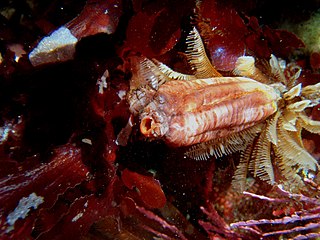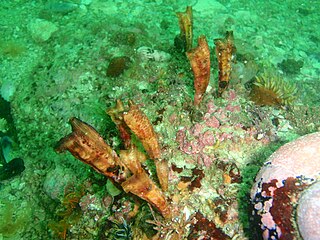
Alba Adriatica is a town and comune with 12,386 residents (2014) in the province of Teramo in the Abruzzo region of central eastern Italy.

Styela clava is a solitary, subtidal ascidian tunicate. It has a variety of common names such as the stalked sea squirt, clubbed tunicate, Asian tunicate, leathery sea squirt, or rough sea squirt. As its common names suggest, S. clava is club-shaped with an elongated oval body and a long peduncle for attaching to a substrate. Although native to the northwestern waters of the Pacific Ocean, since the 1900s, S. clava has become an increasingly successful invasive species outside of its native range. It is edible.

Styela is a genus of tunicates. Styela clava, an edible species, is known as an invasive species in some areas.

Adria and Adriatica are parent Swiss watch brands manufacturing for Eastern European markets.
Adriatica was a post World War II displaced person camp in northern Italy.

Styela plicata, commonly known as pleated sea squirt, is a species of tunicate in the family Styelidae. This sessile filter feeder can expel water when threatened.

Styela montereyensis, also called the stalked tunicate, Monterey stalked tunicate, and the long-stalked sea squirt is a solitary ascidian tunicate. It has a cylindrical, yellow to dark reddish-brown body and a thin trunk that anchors it to rocks. It is found in subtidal areas of the western coast of North America from Vancouver Island to Baja California.

Styela angularis is a solitary, hermaphroditic ascidian tunicate that is found along the coast of Southern Africa from Lüderitz Bay in Namibia to the Eastern Cape.
Iris adriatica is a plant species in the genus Iris, it is also in the subgenus Iris. It is a rhizomatous perennial, from the Dalmatia region of Croatia in Europe. It has short sickle shaped leaves, small stem and flowers that vary from yellow to purple or violet. It is rarely cultivated as an ornamental plant in temperate regions.

The Rete Adriatica Class 500, classified after 1905 in the Ferrovie dello Stato Italiane as Class 670 was an unorthodox and iconic cab forward 4-6-0 (2'C) steam locomotive.

Angeliki Panagiotatou was a Greek physician and microbiologist. She was the first woman physician in modern Greece to have graduated from a University in Greece.
The 1999 Tirreno–Adriatico was the 34th edition of the Tirreno–Adriatico cycle race and was held from 10 March to 17 March 1999. The race started in Sorrento and finished in San Benedetto del Tronto. The race was won by Michele Bartoli of the Mapei team.

Giovanni Carboni is an Italian cyclist, who rides for UCI Continental team JCL Team Ukyo. In May 2019, he was named in the startlist for the 2019 Giro d'Italia.
The 2018 Adriatica Ionica Race/Following the Serenissima Routes was a five-stage men's professional road cycling race.
The Adriatica Ionica Race is an Italian annual professional men's road bicycle race introduced in the 2018 season as a part of the UCI Europe Tour, and currently classified as a 2.1 event. The race is organised by former professional cyclist Moreno Argentin and ASD Sport Union.
The 2019 Adriatica Ionica Race was a five-stage men's professional road cycling race.

Filippo Zana is an Italian professional racing cyclist, who currently rides for UCI WorldTeam Team Jayco–AlUla. Professional since 2020, he has won the 2023 Tour of Slovenia as well as stage 18 of the 2023 Giro d'Italia. He was also the 2022 Italian national road race champion.
The 2021 Adriatica Ionica Race/Sulle Rotte della Serenissima was a road cycling stage race that took place between 15 and 17 June 2021 in the northeastern Italy. It was the third edition of the Adriatica Ionica Race and a category 2.1 event on the 2021 UCI Europe Tour.
The 2022 Adriatica Ionica Race/Sulle Rotte della Serenissima was a road cycling stage race that took place between 4 and 8 June 2022 in the northeastern Italy. It was the fourth edition of the Adriatica Ionica Race and a category 2.1 event on the 2022 UCI Europe Tour. The race was won by Filippo Zana who didn't win a stage but finished second in two decisive stages.









